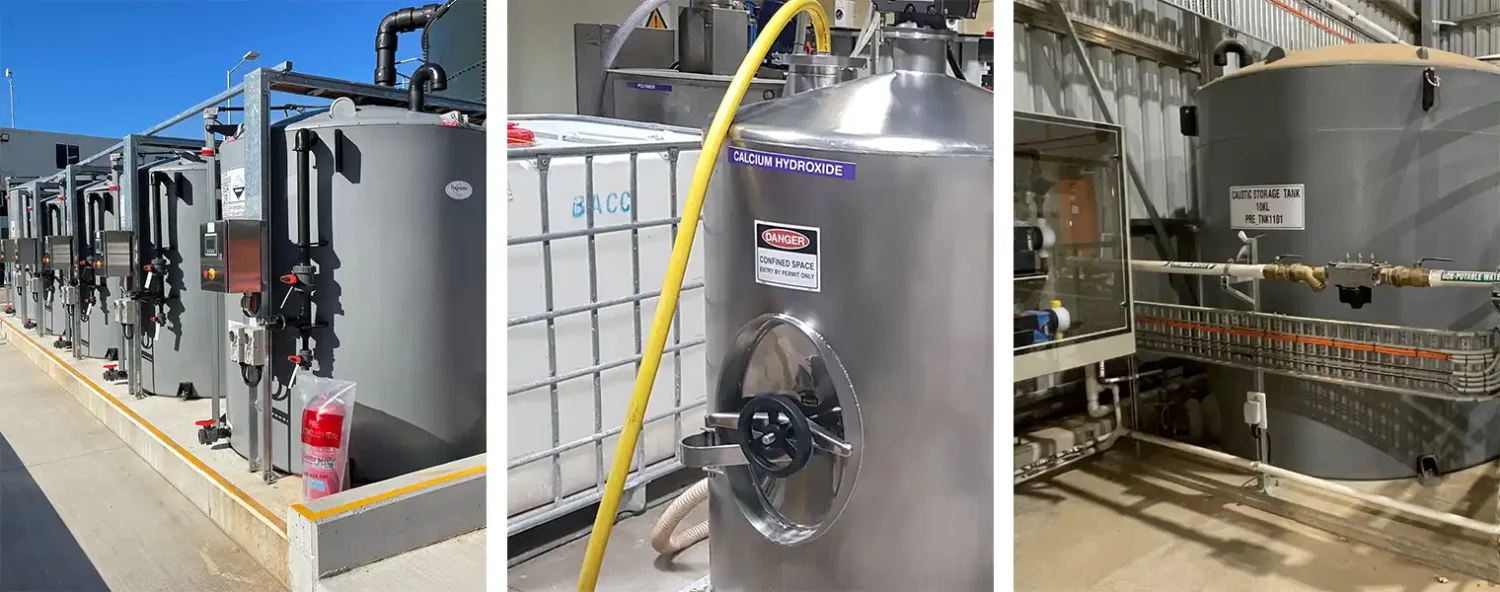
HydraBASE® Alkalis Series

Hydroflux Utilities offers a comprehensive range of alkalis in our HydraBASE® chemical series, used in various water and wastewater treatment and sludge conditioning applications.
All HydraBASE products are available in convenient packaging options including pails, drums and 1000 L IBCs, for liquids, and 15 kg or 1 tonne bulk bags for solid products. We can also deliver liquids and solid products in bulk quantities.
We can provide a comprehensive range of HydraBASE products based on:
- Sodium Hydroxide (NaOH) – Also known as caustic soda, it is widely used to raise the pH of water.
- Calcium Hydroxide (Ca(OH)₂) – Known as lime or slaked lime, it is used for water softening and to increase alkalinity.
- Sodium Carbonate (Na₂CO₃) – Also called soda ash, it is used to increase the pH and alkalinity of water.
- Magnesium Hydroxide (Mg(OH)₂) – Used for pH adjustment and as a neutralising agent.
- Potassium Hydroxide (KOH) – Used similarly to sodium hydroxide, it is employed for pH control and as a neutralising agent.
Why choose Hydroflux Utilities as your HydraBASE Supplier?
Selecting the appropriate alkali for water treatment at the proper concentration enhances process performance and minimises operational expenses. Hydroflux Utilities understands the impact of alkali selection on process safety, equipment reliability, and water chemistry changes.
Our experienced team operates and maintains alkali dosing and control systems, routinely optimising to prevent excess alkali usage. With our operational experience and diverse range of alkalis for water treatment, you can trust that you’ll receive the right product to meet your treatment objectives.

Hydroflux Utilities is more than just a chemical supplier
Your trusted advisor – Hydroflux Utilities goes beyond being just a chemical supplier.
When engaged in a chemical supply contract, we schedule free regular site visits where Hydroflux professionals discuss various aspects of the plant performance and chemical usage, and offer professional advice for further optimisation, ensuring continuous improvement in your treatment processes.
Efficient national chemical supply chain
Whether you are purchasing HydraBASE in pales, IBCs, bulk bags or bulk deliveries, Hydroflux has dedicated logistics teams that ensure a streamlined supply of chemicals to customers from our warehouses. We deliver chemicals to your site seamlessly and on time through well-established supply chains, minimising disruptions to your operations.
We also rent chemical dosing systems
Renting HydraBASE dosing equipment allows you to access the latest technology without the high upfront costs and long-term commitment of purchasing. Whether you need temporary solutions for seasonal demands, emergency situations, or trial periods before investing in permanent systems, renting can provide the adaptability and support necessary to ensure optimal performance of your process operations.
Sustainable Solutions
As Australia’s first certified carbon-neutral water and wastewater chemical supply and service business, developing and delivering sustainable solutions for treatment plant operation and maintenance is at the core of what we do. Our HydraBASE alkalis are the most sustainable in the Australian and New Zealand market. They are not just effective at protecting our valuable water resources but are also carbon-neutral. Click here to find out what this means for you.

HydraBase FAQs
Several alkalis are commonly used in water treatment to adjust pH. Sodium hydroxide (NaOH), also known as caustic soda, is widely employed for pH adjustment and neutralising acidic waters. Calcium hydroxide (Ca(OH)₂), or slaked lime, is used for pH adjustment, water softening, and can improve precipitation in some applications. Sodium carbonate (Na₂CO₃), known as soda ash, is utilised for pH adjustment and to precipitate hardness ions like calcium and magnesium. Magnesium hydroxide (Mg(OH)₂) is also used for pH control and neutralisation as it provides more alkalinity per kilogram than either lime or caustic soda, and it is much safer to handle than most other alkali’s.
The answer depends on your situation. Using lime over sodium hydroxide in wastewater treatment can offer several advantages. Lime is generally more cost-effective, making it a more economical choice for large-scale operations. It usually also produces a denser sludge that is easier to handle and dewater than the sludges produced by sodium hydroxide, and this enhances the efficiency of sludge management using lime. Lime though takes longer to react than sodium hydroxide and overdosing is more likely without suitable reaction times. Another shortcoming of lime is that it takes specilised equipment and dosing systems to get the best economy from lime, and these systems can be expensive to buy and maintain.
Sodium hydroxide (NaOH), especially in its concentrated liquid form, can freeze at relatively high temperatures compared to water. For example, a 50% sodium hydroxide solution has a freezing point of around 12°C. This means that in cooler climates or during winter, concentrated NaOH solutions can solidify, which can pose challenges for storage and handling. Sometimes the wind chill is degrees lower than the air temperature, so the sodium hydroxide in dosing lines etc. can freeze even though the container of sodium hydroxide remains as a liquid. Proper precautions, such as insulated storage tanks, dosing lines or heating systems, can be a necessity in some applications.
In wastewater treatment plants, magnesium hydroxide is commonly supplied as a slurry, which allows for easy handling and immediate use for pH control and neutralisation processes.
Regulations and guidelines, such as those outlined in Australian Standards AS 3780-2008 for the storage and handling of corrosive substances, typically require that acids and alkalis be stored separately to prevent accidental mixing, which can lead to violent reactions, the release of toxic gases, or other hazardous conditions. Proper segregation, use of appropriate bunding, and adherence to safety protocols are essential for minimising risks.
The Hydroflux Group
Hydroflux Utilities, being part of the Hydroflux Group has access to extensive expertise in water and wastewater treatment processes, mechanical and electrical design, programming and turnkey construction. By leveraging the collective knowledge and resources of the Hydroflux Group, Hydroflux Utilities ensures that you receive high-quality, innovative solutions that meet your specific needs and deliver sustainable results for your water, wastewater or sludge treatment processes.
